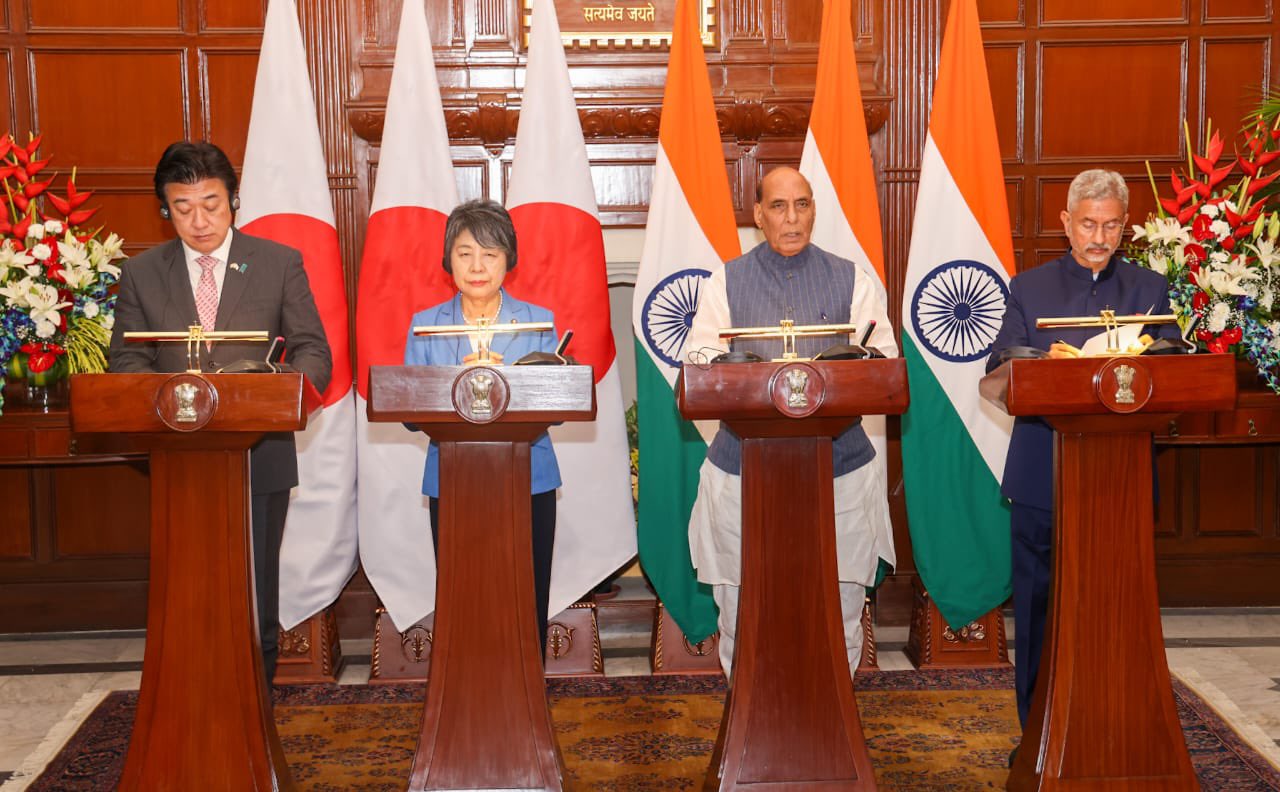
India and Japan forge ahead with enhanced security cooperation in the Indo-Pacific
NEW DELHI : India and Japan have recently reaffirmed their commitment to bolstering security cooperation in the Indo-Pacific region, highlighting their shared interests in maintaining stability and promoting a rules-based order. This renewed focus on collaboration was solidified during the third 2+2 ministerial dialogue held in New Delhi, which brought together the foreign and defence ministers from both nations. As a key outcome of these talks, the two countries agreed to update their 2008 Joint Declaration on Security Cooperation, with the revised document expected to be unveiled during Prime Minister Shri Narendra Modi’s upcoming visit to Japan for the annual summit.
Integration of Japan’s Unicorn System into Indian Defence
A major development from the dialogue was the decision to advance discussions on incorporating Japan’s advanced Unicorn stealth antenna system into Indian naval warships. This system, formally known as the Unified Complex Radio Antenna (UNICORN), consolidates multiple antennas into a singular, streamlined structure. By doing so, it significantly reduces the radar signature of warships, making them less detectable and thereby enhancing their stealth capabilities.
Japanese Defence Minister Minoru Kihara emphasized the importance of this technological transfer, noting the progress already made in the collaboration. “Our cooperation in unmanned ground vehicles and robotics has laid a solid foundation, and we are now poised to move forward with the Unicorn system,” Kihara stated. This integration is expected to enhance India’s naval prowess, particularly in the strategically vital Indo-Pacific waters.
Shared Vision for a Free and Open Indo-Pacific
During the dialogue, both nations reiterated their commitment to a free, open, and rules-based Indo-Pacific, a region that has become increasingly central to global strategic interests. Indian Foreign Minister S. Jaishankar underscored this shared vision, stressing the importance of collaborative efforts to maintain regional stability. The ministers explored the possibility of expanding their defence and security cooperation to include other like-minded countries, aiming to promote peace and deter aggressive actions in the region.
This aspect of the dialogue reflects the growing concern over China’s assertive policies in the South and East China Seas. By working together, India and Japan hope to contribute to a more balanced power dynamic in the Indo-Pacific, ensuring that the region remains open and accessible to all nations.
A Firm Stance Against Terrorism
Another critical area of focus was the ongoing fight against terrorism. While the joint statement from the dialogue did not explicitly name Pakistan, it strongly condemned cross-border terrorism and called for decisive action against groups such as Al Qaeda, ISIS, Lashkar-e-Tayyiba (LeT), and Jaish-e-Mohammad (JeM). The statement also demanded justice for the perpetrators of the 26/11 Mumbai and Pathankot attacks, reflecting the deep concern shared by both nations over the threat of terrorism.
Foreign Minister Jaishankar reiterated India and Japan’s united stance against terrorism, emphasizing that both countries are committed to combating this global menace. This shared resolve is expected to strengthen their collaborative efforts in counter terrorism and related security initiatives.
Increasing Military Interoperability Through Joint Exercises
The dialogue also highlighted the growing frequency and complexity of joint military exercises between India and Japan. Japan’s participation in India’s Tarang Shakti air combat exercise, along with its involvement in the upcoming Malabar naval exercise in the Bay of Bengal, underscores the deepening military ties between the two nations. These exercises are designed to enhance interoperability between their armed forces, a crucial factor in responding to regional security challenges.
The Malabar exercise, which originally started as a bilateral event between India and the United States, has now expanded to include Japan and Australia as regular participants. This broader participation reflects the increasing importance of multilateral cooperation in addressing shared security concerns in the Indo-Pacific.
Strengthening Defence-Industrial Ties
In addition to military exercises, India and Japan are also focusing on enhancing their defence-industrial cooperation. Indian Defence Minister Rajnath Singh emphasized the strategic value of partnering with Japan to boost India’s domestic defence manufacturing capabilities. This collaboration is seen as a vital component of India’s broader strategy to become a global hub for defence production.
Singh pointed out that the partnership with Japan is particularly important in the context of China’s growing assertiveness in the region. By working together, India and Japan aim to strengthen their respective defence industries while contributing to regional security and stability.
Expanding Diplomatic Engagement
Further cementing their bilateral relationship, India announced plans to open a new consulate in Fukuoka, Japan. This move is part of a broader strategy to enhance diplomatic ties and facilitate closer cooperation across various domains. Additionally, the two countries agreed to explore the possibility of allowing Japanese naval ships to undergo repairs in Indian shipyards, a move that could significantly deepen their defence cooperation.
Bottomline
The recent 2+2 ministerial dialogue between India and Japan marks a significant step forward in their strategic partnership. By updating their Joint Declaration on Security Cooperation and advancing key defence collaborations, both nations are poised to play a more prominent role in maintaining peace and stability in the Indo-Pacific. As India and Japan continue to strengthen their ties, their partnership is set to become an increasingly important pillar of regional security in the years to come.
